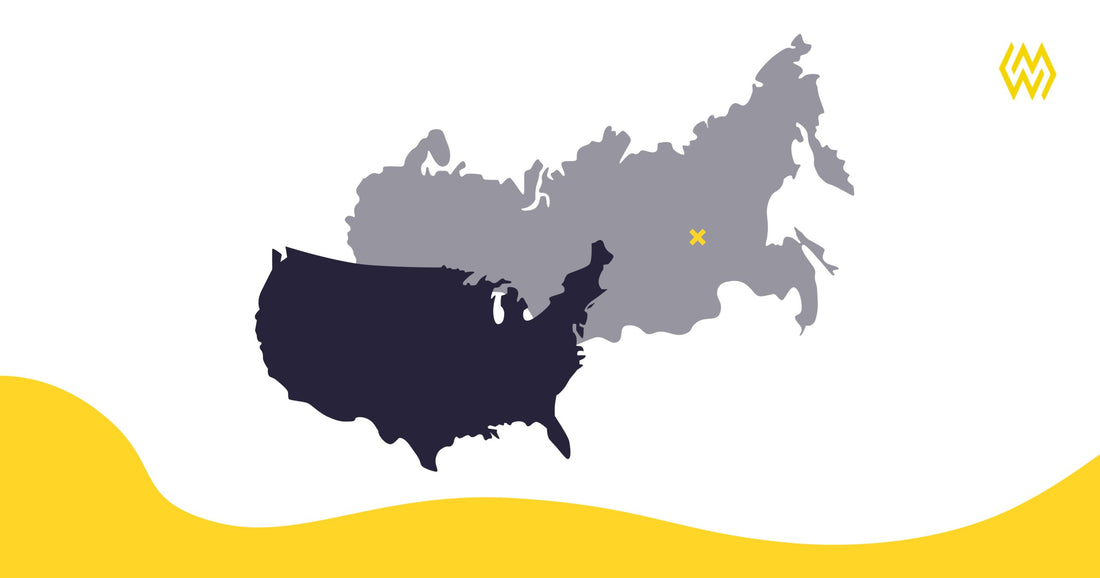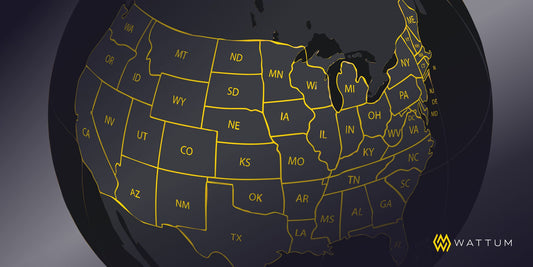Colocation services for Bitcoin miners saw a sudden spike in demand in August 2021, crowding the already low availability within the United States that is projected to last into the early months of 2022. In September 2021, Russia became a sought out hot spot for miner colocation, with Wattum proactively having reserved space for over 6,000 Bitmain S19 Bitcoin miners for our customers.
Your first thought when considering the running of Bitcoin mining operations in Russia may be a negative one; Russia has been painted in a negative light for years by the likes of CNN and Fox News. However, if you’re just getting into Bitcoin mining, the world is sure to feel a bit smaller in just one year's time: countries like Russia and Kazakhstan will become as close to you as any state in North America, and (hopefully) the stigma surrounding Russia will be reduced.
Russia’s Culture and Diversity
Based on the area of land, Russia can truly be categorized as massive: it is nearly double the size of the U.S. despite having just under half the population size. But, like the U.S., Russia has its own culture and norms that are not represented, and are rather misrepresented, by Western media when discussing the Eastern European country. Russia has its own pop culture that is just as diverse and influential to its side of the continent as America’s is to the West, with huge cities like Moscow and Crimea that are comparable to New York City and Miami. Russia also has expansive oil fields and massive amounts of both hydro and nuclear power. To sum it up, Russia is much more than it’s made out to be by American films and media, and it doesn’t deserve the negative image it’s been given in the past.

Russia has its own, full legal system and structure, and is an incredibly safe and stable country. The local government has a full court system, just like the U.S., and recognizes personal property: if someone steals from you, they will be prosecuted and held accountable by the law and your property returned. Furthermore, the Russian government itself has not confiscated property without a legal process since the early 1990s (hence the movie references).
Russia is home to over 68,000 attorneys, meaning there is an attorney for every 390 residents, coming close to numbers in the U.S. which has about 248 residents per attorney. Including legal advisors, Russia has the third highest number of legal professions in the world, speaking to its affluent education system and driven, intellectual citizens. If Russia were to have no laws, as depicted in much of Western media, there could not be as much legal representation as they currently have, nor could there be the economic growth potential that there is.

Russia, Bitcoin, and the Russian Association of the Crypto Industry and Blockchain (RACIB)
Over the last 11 years of Bitcoin’s lifetime, there has never been an incident that saw Russia shutting down or taking Bitcoin mining equipment away from miners. As long as electricity is purchased legally, and Bitcoin miners have been properly imported through customs with duties paid, there is no reason to fear that the Russian court system will seize your mining equipment. In fact, The Russian Association of Cryptoeconomics, Artificial Intelligence and Blockchain (RACIB) recognizes the advantages posed by Russia in terms of abundant power and space, and is actively trying to increase mining operations in the country.
A number of the largest mining companies and facilities in the world reside in Russia, offering everything from colocation and hosting to mobile container production. In fact, Wattum’s newest Bitcoin Mining Containers are manufactured in a factory in Russia that has deployed over 50MW of containers within Russia since 2018. Further, some of the biggest Bitcoin mining farms in Russia are operated by globally recognized companies, including BitRiver, BitCluster, MinerPark, GoMining, MineInvest, and, of course, MyRig.
Moscow is home to one of the largest Bitcoin mining farms in the world, estimated to have a hashpower of 38PH. The RACIB expects that the total capacity of data processing centers and mining farms will reach 6,000 Megawatts of power in the near future; 6,000 Megawatts of power would be equal to 2,160,000 Bitmain S19 units, which would have a value of $21,600,000,000 USD.
Duties for importing mining equipment into Russia from China are similar to those set by the U.S. under President Trump, at around 27% total. However, because Russia borders China in the East, it makes transportation costs much cheaper.
On a governmental level, Russia has stated that they don’t yet see any value in adopting Bitcoin as legal tender, but legal status was given to cryptocurrencies like Bitcoin in 2020. Russia is on the right path when it comes to regulation, and is expected to move forward with bills for crypto taxation, mining, and digital currency issuance in the near future. Chairman of the Russian State Duma Committee on Financial Markets Anatoly Aksakov has even claimed that “Russian lawmakers are now considering recognizing the crypto mining industry as a form of entrepreneurship under local business laws.”
Much of the growth in overall share of hashrate has been reserved to the United States and China, with much of China’s share recently trickling down to the U.S. From April 2020 to April 2021, the growth in the share of overall hashrate is evident in the United States, Kazakhstan and Russia as the top 4 on this list, with China becoming a less relevant player due to their recent crackdown on Bitcoin mining and increased regulation. As seen in the charts below, despite such a significant shift in the mining industry and dispersion of hash power, Russia's share remained incredibly stable. It is also safe to anticipate that both this stability and dispersion will continue, and will trickle down amongst the top 4 to see continued growth in their share of overall hashrate.


With much of the hashrate share dispersion moving from China to the United States, the trend has continued to show a trickle from the U.S. to Kazakhstan, which has even cheaper duties and shipping fees than Russia. However, with Kazakhstan’s colocation availability capped out as a result of the region being recognized for its untapped opportunities, Russia is now the next pivot. You would be hard pressed to find hosting in the United States right now for under $0.089/kWh, while Russia offers competitive rates at $0.075/kWh. Some quick math would show you that you can be saving over $30 per miner every month, and earning more as a result. Take the S19 Pro (110TH) for example: currently making $960 in revenue every month, at the time of writing, the cost for hosting this miner would amount to $175.70, comparable to $208.40 in the U.S.
Wherever your Bitcoin miners physically reside, you will most likely never see them firsthand as this would require a multi-day travel commitment that simply wouldn’t be worth your time. So, as long as they are safe, there is little difference between hosting your miners in the United States versus Russia. Miners looking to expand their operations should reconsider hosting in the United States, and for good reason. The most recent legislation passed under the Biden administration’s infrastructure bill states that Bitcoin miners are required to register as crypto brokers, without any clear guidance on how to do so and a broad definition of what it means to be a broker. With such heavy ambiguity, you should expect intense regulation on your Bitcoin miners in the near future. Should you choose to host your Bitcoin miners in Russia, you’ll enjoy much more flexibility in your options when the time comes, options which will be limited if your Bitcoin miners are physically colocated in the United States.
Wattum and MyRig
MyRig is a professional team that has just recently won an award for Best Mining Service at Blockchain Life 2021, held in Moscow earlier this year.
MyRig has been our hosting partner since May 2021. We have performed multiple tests on-site by powering 120 of our own S19 units at one of their hosting facilities, and were extremely pleased to see the success of the process, fuelling our confidence in their abilities to host Bitcoin miners. Wattum had the opportunity to meet their team at Miners Disrupt Miami in the United States in July 2021, and have also had the pleasure of meeting both their CEO and their legal counsel via Zoom video chat to discuss a long term relationship. We have recently structured a new agreement between Wattum and MyRig that effectively protects Wattum and our valued customers, allowing us to offer you a fair and competitive colocation agreement. As a result, we have reserved additional space for 6,000 S19 Bitcoin miners that will be hosted at the facility.
Below are some photos of the MyRig hosting site in Russia, as well as some images from their recent trade shows to provide visual context into the reliability and quality of the mining operations offered directly through their services. It’s an opportunity that doesn’t want to be missed.





As a U.S.-based corporation, with main operations executed out of Wyoming, Wattum does its due diligence when it comes to partnering with companies around the globe. We wouldn’t be working at the scale that we are if we didn’t.

Dedicated to providing our customers with secure mining operations, Wattum keeps a stringent delivery track record and is the main point of contact for all of our customers, regardless of where they are hosting their equipment. This means you are always working with our standards of customer service, trustworthiness, and professionalism, woven into a tight safety net to give you peace of mind and effective mining operations. Get in touch with the Wattum team today to take advantage of the cheap, renewable energy and hosting services that Russia and MyRig have to offer. It’s that simple.
Update on October 13, 2021:
Towards the end of August 2021, the CCAF found that Russia accounted for 11% of the global hashrate, while the U.S. accounted for 35.4% and China dropped down to zero, further speaking to Russia's strengthening hold on the Bitcoin mining landscape as dispersion of global hashrate share continues following the regulatory crackdown in China. The current Bitcoin network hashrate sits at 167.12M TH/s.



